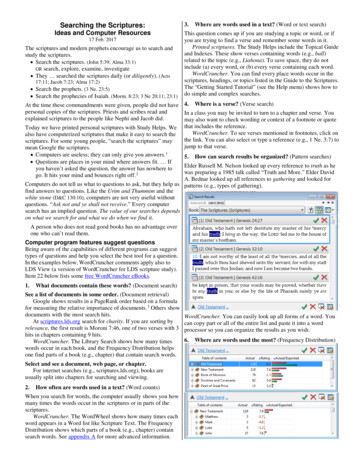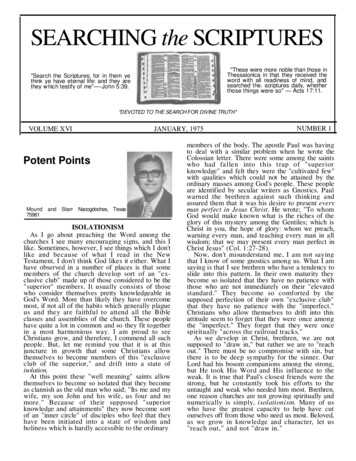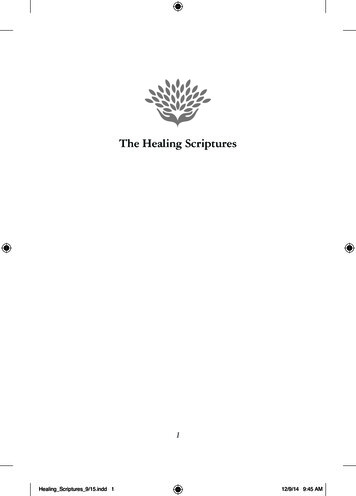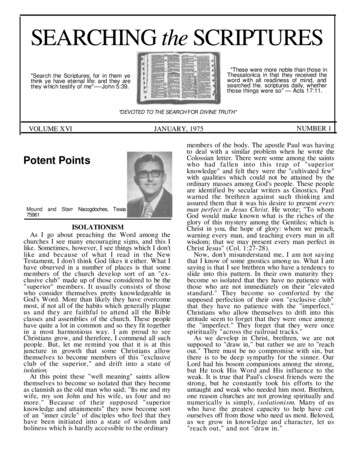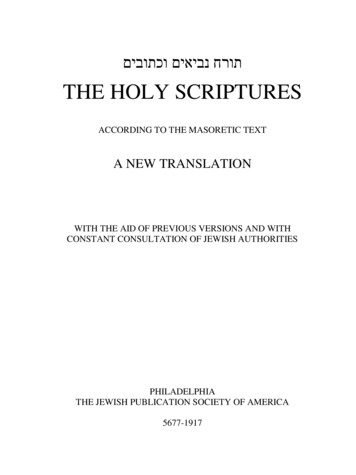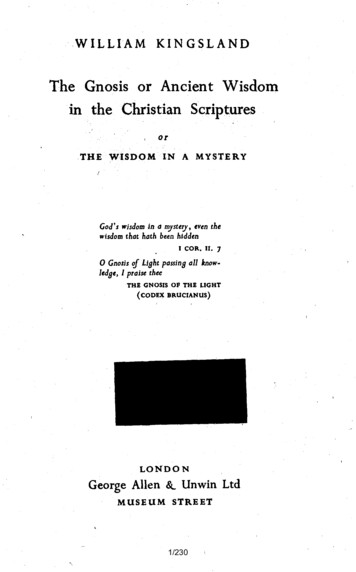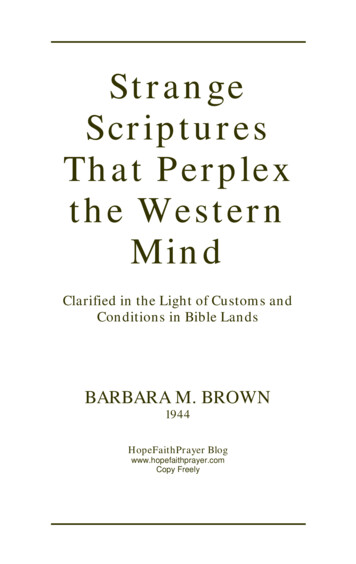
Transcription
StrangeScripturesThat Perplexthe WesternMindClarified in the Light of Customs andConditions in Bible LandsBARBARA M. BROWN1944HopeFaithPrayer Blogwww.hopefaithprayer.comCopy Freely
Strange Scriptures That Perplex the Western MindCONTENTSIntroduction. 1Perplexing Scriptures. 3Women . 27Garments. 36Clothing and Jewels. 47Peasant Men . 62Home Life . 80Feasts. 95Fields . 107Tombs and Tents. 123Gates and Trades . 135Special thanks to:http://www.baptistbiblebelievers.com/
Strange Scriptures That Perplex the Western Mind1INTRODUCTIONFrequently after our lectures on the land andthe people of the country of our Lord, peoplehave requested us to bring together in a booksome of the customs and thoughts and ways ofthese people that appear strange to us.Palestine has changed very little since Bibledays, the people are chiefly Ishmaelites anddress, eat, live and think as their ancestors did.They live this very primitive life because theirparents and grandparents for a hundredgenerations have lived so.They say, “Our father Abraham lived as we do,what was good for him is good for us; whatwas good enough for yesterday is goodenough for tomorrow.”A better understanding of their lives, theirhomes, their dress, their work and their waysof thinking will help us to comprehend manyScriptures that now appear strange.This small book contains nothing new, butbrings together information on many customsdiffering so widely from those of our part of theworld that we hope it will help Sunday schoolteachers and young people to a little betterunderstanding of some parts of THE BOOK.Barbara M. Bowen
Strange Scriptures That Perplex the Western MindDEDICATEDto the companion of all my journeys,my partner in work and study,my husband,Frank Henry Bowen2
Strange Scriptures That Perplex the Western Mind3Chapter OnePERPLEXING SCRIPTURES“Salute No Man by the Way” (Luke 10:4)JESUS is sending out the seventy, two by two,into every city and place where He himselfwould come. He tells them that the harvest isvery great but there are few laborers. He tellsthem to carry neither purse, nor scrip, norshoes; and to salute no man by the way.This sounds to our ears rather impolite and notlike Jesus, who was kind and friendly. We areaccustomed only to the manners of theWestern world and we think merely of a nod ofthe head, a smile, or a grasp of the hand,which takes very little time.Why did Christ command the seventy to saluteno man by the way? They were on veryimportant business, going out as messengersfor their King and they must not loiter in idleconversation with the people they would meeton the way.If a peasant from the Bible Lands should cometo our country and watch us hurrying to catch atrain and see us nod to a friend as a salutation,he certainly would consider us extremelyimpolite. No peasant would ever be so rude.When he walks through a town or village and
Strange Scriptures That Perplex the Western Mind4meets an acquaintance, he rushes up to himand falls on his neck and kisses him on bothcheeks, as the father of the prodigal son did.Then they each lay the right hand over theheart, then on their lips, and then slowly raise itto the forehead; and after that clasp eachother's hands.-Placing the hand over the heart is saying,“With my heart I love you”;-Placing the hand on the lips is saying, “Withmy lips I give you the kiss of friendship”;-Raising the hand to the forehead signifies, “Iesteem and respect you.”Next they exchange greetings and inquire aftereach other's welfare. Then they question eachother with complimentary speeches whichwould take, at the very least, another half hour,and they embrace again and depart.Time is of no importance to these villagers andyou never saw one hurry. They frequentlystand by the hour repeating over and over thesame words, such as, “Is there peace withthee? Is there peace with thy house?”When we read in the Bible, “Is it well?” themeaning is, “Is there peace?” (Genesis 37:14).“And he said to him, Go I pray thee, seewhether it be well with thy brethren, and wellwith the flocks.” This is also found in manyother places in the Bible.
Strange Scriptures That Perplex the Western Mind5Because of this very common custom of suchlong greetings, Elisha said to his servantGehazi, “If thou meet any man, salute him not”(II Kings 4:29).Salutations today are just as lovely as in OldTestament days. When you meet a friend inany of the Bible Lands, he exclaims, “Peace beunto you.” When he leaves you he will say,“God go with you” — “Mar salaam,” to a man;“Mar salaami,” to a woman. You reply, “Peaceremain with you” — “Allah selmack,” to a man;“Allah selmick,” to a woman.A native may be just longing to kill you, and yetwhen you meet him on the street, he will stopand greet you thus: “May your days beblessed! God give you health and smooth yourpath! Peace to your lives. Go in peace.”The Bible has many salutations which arecommon today in Bible Lands. When the angelGabriel appeared to Mary in Nazareth toannounce to her that she was to be the motherof the Messiah, Mary was troubled in her mindto know what manner of salutation the angelused — was it the usual form, was it flattery, orhad it a real meaning?There is scarcely a salutation found in theBible that may not be heard spoken every dayin the villages of Palestine. All this helps usbetter to understand why Christ said to thedisciples, “Salute no man by the way.”
Strange Scriptures That Perplex the Western Mind6“Go Not From House to House” (Luke 10:47).“And whatsoever house ye enter into, thereabide.”Christ sends out the seventy helpers withthese instructions: “Carry neither purse norscrip nor shoes: and salute no man by the way.And into whatsoever house ye enter . . . in thesame house remain, eating and drinking suchthings as they give: for the labourer is worthyof his hire.” This sounds strange to our ears,but remember there were many people to carrythe Good News to, and not much time left inwhich to accomplish this work.When a stranger arrived in a village or anencampment, the people, one after another,must invite him to eat with them. There is avery strict custom about it, involving muchhypocrisy; and any failure to observe this lawof hospitality is violently resented by all theneighborhood, and often leads to feuds.This hospitality consumes an enormousamount of time, leads to levity and gossip, andin every way would counteract the success ofthe spiritual mission on which the discipleswere sent.On account of all these obstacles, the helperswere instructed to avoid all these feasts.
Strange Scriptures That Perplex the Western Mind7Christ was sending them out, not to behonored and feasted, but to call men torepentance. They were, therefore, first to finda suitable place to lodge in, and to remainthere until their work for the Lord in that villagewas accomplished.“Go not from house to house, carry no scrip.”The scrip is the whole skin of a kid, dried. It isfastened to the belt or a cord, and is thrownover the shoulder under the outer garment.The traveler will carry in this scrip bread, figsand olives, enough to last on his journey. Thedisciples were told not to take scrip or foodwith them (Luke 9:3).“Suffer Me First to Bury My Father”(Matthew 8:21; Luke 9:59).“And Jesus said to a man, Follow me. But hesaid, Lord, suffer me first to go and bury myfather. And the Lord replied, Let the dead burytheir dead.”This answer appears to us very harsh andunsympathetic. We see in our mind a youngman grieving for a dead father and wishingnaturally to remain near him, and Jesus callshim, and the young man refuses the call.The Palestinian understands this as beingnothing in the world but an excuse, and an
Strange Scriptures That Perplex the Western Mind8exceedingly common one in that country. Nodoubt the father was perfectly well and strong,but the son did not want to follow Christ, andas was the common custom, he answered,“No, I cannot, my father is dead and I mustbury him.”If you ask some natives even today to doanything they do not want to do, they will notanswer that they do not feel well, or haven't thetime, but they will instantly say to you, “No, Icannot, my father is dead.”“The Lord Hath Made Bare His Arm” (Isaiah52:10).“The Lord hath made bare His holy arm in theeyes of all the nations; and all the ends of theearth shall see the salvation of our God.”The meaning of this Scripture is clear, but thevividness of it is hidden unless one has seenthe women of the Bible Lands taking their longflowing sleeves, tying the ends in a knot, andthrowing them over their shoulders to leave thearms bare so they can work unhindered.The men will do the same with the longsleeves of their kamise, tie the ends togetherand throw them over their heads, so that theycan go out to fight and not be hindered by longpointed sleeves.
Strange Scriptures That Perplex the Western Mind9“The Lord hath made bare his arm.”“He Shall Dwell Between His Shoulders”(Deuteronomy 33:12).“The beloved of the Lord shall dwell in safetyby him; and the Lord shall cover him all the daylong, and he shall dwell between hisshoulders.”This Scripture refers to the Bible Lands'hammock or cradle, made of camel's hair, andused by the village mothers and the mothers ofthe tent dwellers. It is a hammock about two bytwo and a half feet, with a strong cord at eitherend, so that it may be carried on the mother'sshoulders, with the cords passing across herforehead.In the field the mother suspends the littlehammock from the limb of a tree, or if there isno tree, she erects a tripod of sticks from whichthe hammock hangs, covering the baby's facewith one of her own garments to protect thechild from the sun and flies.How often we have seen a small hammock onthe shoulders of a young mother, with a tinyface peeking out, or more often with a sleepingbaby and a little foot or a small hand showingat the side of the hammock.When the mother carries the child, she will
Strange Scriptures That Perplex the Western Mind10draw a part of her large white veil over thehammock as a protection against the hot sun,either partly or completely covering it.This is the common picture referred to inDeuteronomy 36:12: “The beloved of the Lordshall dwell safely by him; and the Lord shallcover him all the day long, and he shall dwellbetween his shoulders.”“Thy Youth Renewed Like the Eagle's”(Psalm 103:5).“Who satisfieth thy mouth with good things; sothat thy youth is renewed as the eagle's.”This fact in the life of the eagle is given as apromise to the righteous.The eagle lives to a very great age. As hegrows old his beak becomes so long that hecan no longer eat; then he flies away byhimself to the top of a cliff and pecks andpecks on a rock until his bill falls off, afterwhich a new bill grows in its place.While without the use of his bill, the bird alsoloses his feathers because of fasting.After the new bill grows and he again takesfood, new feathers start growing, so that helooks and appears like a young eagle, goingforth in a new covering with youthful beautyand strength.
Strange Scriptures That Perplex the Western Mind11“Thy youth is renewed as the eagle's.”“The Eagle Stirreth Up Her Nest”(Deuteronomy 32:11).“As the eagle stirreth up her nest, flutterethover her young, spreadeth abroad her wings,taketh them, beareth them on her wings.”Moses is telling the people how God deals withhis children.The mother eagle watches her baby eagletscarefully; as they grow, she stirs them up a bitso they will not be contented to lie in the nest:she then flutters over them to make them wantto use their wings as she does; then shepushes them out of the nest and flies downbeneath, carefully watching them so no harmwill come to her children. When her mother eyesees the little wings growing weary, shespreads out her great strong wings; catchesthem and bears them back to the nest for rest.The nest is always very high.A fall would mean the end of flying, but themother eagle knows when it is time to shakethe young out of the nest and when to fly downto bring them back.That is what God does for us, bears us oneagle's wings.
Strange Scriptures That Perplex the Western Mind12“And David Danced Before the Lord” (IISamuel 6:14).“And David danced before the Lord with all hismight: and David was girded with a linenephod.”At the head of a great procession there wouldfrequently be seen a half naked buffoondancing, going through gesticulations usual onsuch occasions. It was all done in honor of theperson to whom the procession was made,and was the office of a slave only.King David and all the house of Israel broughtup the ark of the Lord with shouting and withtrumpets; and David danced before the Lord,he took the place of a slave at the head of theprocession to do honor to the Lord.Michal, King David's wife, not understandingher husband's motive, and thinking he hadlowered himself before the people, reproachedhim bitterly, and despised him in her heart.“Bathed His Feet With Tears” (Luke 7:38).“She began to wash his feet with tears, and didwipe them with the hairs of her head.”We find reference in many old books to thecustom of collecting the tears of the whole
Strange Scriptures That Perplex the Western Mind13family and preserving them in bottles. ThusKing David prays, “Put thou my tears into thybottle: are they not in thy book?”Tear bottles have been found in very largenumbers on opening ancient tombs. They aremade of thin glass usually, although the verypoor sometimes had just simple pottery bottles,not even baked or glazed. They were all madewith a slender body, broad at the base, with afunnel-shaped top. Every member of the familyowned a tear bottle and they collected thetears of the whole family.When serious trouble or a death occurred inthe home, all the relatives came and each onebrought his tear bottle with him. As they weptand wailed, the tears rolling down their cheeks,each person took his or her tear bottle andgathered tears from the faces of all present.This bottle was exceedingly sacred to them. Itrepresented all the heartaches, sorrows andbereavements from the grandparents down tothe small child. When a person died, his tearbottle was buried with him, as one of his mostsacred possessions.This helps us to a better understanding of whatthe woman did for her Master. She noticed thevery discourteous way in which Christ wastreated as a guest in the house of Simon thePharisee. He provided no water to wash theLord's feet and no oil to anoint his head; so this
Strange Scriptures That Perplex the Western Mind14poor, sinful woman, longing for forgivenessand a new life, took her tear bottle, poured thetears over his tired, dusty feet and wiped themwith her long hair. A great sacrifice indeed,done in love and gratitude to the Saviour. Theycould not be replaced and she might diewithout a bottle of tears to be buried with her inher tomb.“She bathed his feet with tears.”“Water on the Hands of Elijah” (II Kings3:11).“Here is Elisha, who poured water on thehands of Elijah.”The same practice prevails to this day.Nowhere is water poured into a basin, but theservant pours water from a pitcher on thehands of his master. Washing of feet was verycommon, and, in a hot country where sandalswere worn, would be essential to comfort.“Moab is my washpot” (Psalm 60:8).Moab was doomed to the most abject anddegrading servitude.In the practice of washing the feet there wasthe combination of humility with affectionateattention; and the Saviour washed hisdisciples' feet, designing by a symbolic actionto teach an important truth.
Strange Scriptures That Perplex the Western Mind15If the Master had performed an office soneedful and yet so lowly, how much more werethe disciples themselves bound to considerany Christian service whatever as a duty,which each was to perform for the other! Lovedignifies any service.Cursing the Fig Tree (Mark 11:12-14; 20-23).While Jesus was on earth He was constantlyteaching His disciples by parables.One strange thing about the fig tree is that thefruit appears before the leaves. If the first fruitdid not appear, there would be no other figs onthe tree.Christ and the disciples were passing andlooked for some of the small but sweet firstfruit. It was a tree with leaves, it looked welland useful, but it was a useless tree, and notonly that, it led the passerby to believe it was agood tree, when it was of no value.It was a type of profession withoutproductiveness. Our Lord could not endurehypocrisy in anyone or anything, andcondemned it more than any other sin. HereChrist is giving His disciples an illustration theywould not easily forget.A person might say this fig tree did not belongto our Savior, and therefore He had no right to
Strange Scriptures That Perplex the Western Mind16take the fruit. We can answer this by referenceto the Mosaic Law in such cases. “You are notto prohibit those that pass by, when your fruitsare ripe, to touch them, but to give them leaveto fill themselves full of what you have.”And the custom of plucking ripe figs as youpass by the orchards is still universal in theBible lands, especially from trees not enclosed.After the feast in September, the figs whichremain on the trees are common property andthe poor may enter the orchards and take allthey want.Lying at the Feet (Ruth 3:7-14).Ruth, when reaping in the field of Boaz, wentto the resting place of Boaz, uncovered hisfeet, and lying crosswise, covered herself withhis cloak or skirt, a custom common all overthe East.By doing so, Ruth just placed herself under theprotection of Boaz; later she asked Boaz tospread his skirt over her. She only asked himto acknowledge her right to his protection.Boaz replied, “I will do to thee all that thourequirest, for all the city doth know that thou arta virtuous women. If thy kinsman will not takethee to wife, I will.”This same custom is referred to in Ezekiel
Strange Scriptures That Perplex the Western Mind1716:8: “I will spread my skirt over thee, and thoubecomest mine.”“Bring the Veil Which Thou Hast UponThee” (Ruth 3:15).“Boaz said, Bring the veil that thou hast uponthee, and hold it . . . he measured sixmeasures of barley, and laid it on her: and shewent into the city.”Whenever a woman of the Bible Lands todaylacks a basket or bag, the veil comes into use.She places what she has to carry in one end ofher long veil, gathers and ties it around withone corner, and places it on the top of herhead. Veils have always been used by thewomen to carry burdens in.People unacquainted with the ancient customsof these lands may wonder how Ruth's veilcould hold so much grain.We think of a veil as being small and made ofgauze or net, but not so in Palestine. Thekhirka, as the veil is called, is made of verystrong material, six feet or more in length andall of four feet wide. The woman places it overher cap, covering her entire headgear, exceptthe coins in front. It is considered veryimmodest for a woman to have her head orhair exposed in public. When at home whereshe is seen only by her family, the veil is
Strange Scriptures That Perplex the Western Mind18removed.Usually veils are made of very heavy whitelinen, embroidered in colors on the ends, whilein the district north of Jerusalem each girlmakes a veil for herself almost covered withbeautiful needlework, so that it will correspondwith the white embroidered robe, or dress forher marriage.“The Wringing of Milk Bringeth ForthButter” (Proverbs 30:33).“Surely the churning of milk bringeth forthbutter, and the wringing of the nose bringethforth blood; so the forcing of wrath bringethforth strife.”The word for “churning” and “wringing” is thesame in Hebrew.It is the wringing of milk that bringeth forthbutter, just as these women are squeezing andwringing this milk in the “bottle.”There is no analogy between our mode ofchurning and pulling a man's nose until theblood comes, but in the Arab operation thecomparison is quite natural and emphatic.What are these women kneading and shakingin that large black bag, suspended from thisthree-legged crotch? That is a bottle, not abag, made by stripping off the entire skin of a
Strange Scriptures That Perplex the Western Mind19young fuffalo. It is full of milk, and that is theirway of churning. When the butter “has come,”they take it out, boil or melt it, and then put itinto bottles made of goats' skins. In winter itresembles candied honey, in summer it ismere oil.Quails (Numbers 11:31, 32).“And there went forth a wind from the Lord,and brought forth quails from the sea, and letthem fall by the camp, as it were a day'sjourney on this side, and as it were a day'sjourney on the other side, round about thecamp, and as it were two cubits high upon theface of the earth.”Commentators tell us that these quail flew“about two cubits above the face of the earth,”that is within reach of the people that mightslay them for food. The statement is not thatthe quails were piled up from the face of theearth two cubits deep. The level of their flightwas two cubits above the earth.“And it came to pass, that at even the quailscame up, and covered the camp: and in themorning the dew lay round about the host.”The quail is a bird of the grouse family. Theyare abundant in all the temperate regions ofEurope and western Asia, migrating to andfrom Africa at the proper season.
Strange Scriptures That Perplex the Western Mind20In the spring they are found in great numbersin the Syrian deserts and Arabia. An immensesupply was furnished the Israelites on twooccasions (Exodus 16:13; Numbers 11:31, 32).Both were at the season of migration, and thebirds were caught in such quantities as tosuffice for a million people for a month. Theywere dried in the sun, and preserved with salt.Bosom (Isaiah 40:11).In the East people usually carry within a fold oftheir robe things that could not be carried in thehand. Isaiah tells us that the Savior will carrythe lambs in His bosom. Lazarus is spoken ofas in Abraham's bosom. We get the idea of abanquet.Lazarus, an ulcerated and crippled beggar,who had lain at the rich man's gate, contentedwith the scraps thrown out to him, wastranslated to a feast, and he had the mostintimate place among all the guests, recliningon the host's bosom. Christ is in the bosom ofthe Father; that is, He possesses the closestintimacy with the Father.The Jews reclined at meals. By thisarrangement, the head of one person wasbrought almost into the bosom of the personwho lay above him, and the guests werearranged so as to bring the most honored
Strange Scriptures That Perplex the Western Mind21nearest to the host.The dinner bed was used by the Romans aswell as by Jews. It had couches built around it.Each man, in order to feed himself, lay nearlyflat on his breast, and stretched out his handstoward the table; but afterwards, when hishunger was satisfied, he turned on his left side,leaning on his elbow.Each person was provided with a cushion orbolster on which to support the upper part ofhis body on a raised position; as the left armsoon became weary. The lower part of hisbody was extended diagonally, with the feetoutwards. We can see how the woman whowas a sinner might come behind Christ andbathe his feet with tears and anoint them.(Luke 7:37, 38).Anointing (Psalm 104:15).“Oil to make the face to shine.”The earliest use of anointing of which we knowis told us in Genesis 28:18. Also we read in(Genesis 31:13: “I am the God of Bethel,where thou anointest the pillar.”The pouring of oil on the stone which had beenJacob's pillow was for the purpose ofconsecration to the service of God. Highpriests and sacred vessels were anointed for
Strange Scriptures That Perplex the Western Mind22the same reason. The king was called “theLord's anointed,” anointed for the service ofGod.The oil was carefully prepared for all suchpurposes and could not be used for anyordinary occasion. Directions for making this oilare found in Exodus 30:23-33. It wascomposed of myrrh, sweet cinnamon andsweet calamus and of olive oil.Anointing was also used on festive occasions.It was the mark of attention paid to guests,here we have the phase “anointed with the oilof gladness.”In Egypt it was customary for a servant toanoint the head of every guest and theomission was considered a sign of mourning.In Luke 7:38, 46, the host neglected to anointthe head of Jesus and provided no water forHis feet. Not only was oil used for the head,but also for the skin. In many countries the useof oil for the body is believed to strengthen itand to protect it from the heat of the sun. Thebodies of the dead were often anointed topreserve them.Ashes (Genesis 18:27).Ashes, in the symbolic language of Scripture,denotes human frailty, as in Genesis 18:27: “I
Strange Scriptures That Perplex the Western Mind23have taken upon me to speak unto the Lord,who am but dust and ashes;” deep humiliation,as in Esther 4:1: “Mordecai rent his clothes,and put on sackcloth with ashes.”To sit in ashes was a token of mourning, as inJob 2:8: “And he sat down among the ashes.”Feeding on ashes appears to express grief.Psalm 102:9: “For I have eaten ashes likebread and mingled my bread with weeping.”There was a sort of lustral water, made withthe ashes of the heifer sacrificed on the greatday of expiation.These ashes were distributed to the people,and the water as well as the ashes used inpurification for sin, and running water shall beput thereto in a vessel:“And a clean person shall take hyssop, and dipit in the water, and sprinkle it upon the tent,and upon the persons that were there, andupon him that touched a bone, or one slain, orone dead, or a grave.”Whited Sepulchers (Matthew 23:27).As in ancient times, so today white-washedtombs mark the place of the dead. They allreceive a new whitening before days orseasons of feasting and worship. The peoplebelieved that to touch or come in contact with a
Strange Scriptures That Perplex the Western Mind24tomb was to defile oneself. Death was theresult of sin, and, therefore causedcontamination. Therefore sepulchers werealways whitewashed. That made them to beeasily seen and avoided.Christ made reference to this practice in anaddress to the scribes and Pharisees.Whitewashing a tombstone did not change thenature of the grave itself, it still contained deadman's bones. The thing might be madeattractive without, but there was no differencewithin.Christ insisted that religion was not to be anoutward decoration merely, just for specialoccasions; it was to be a life principle, givingreality to all we do.“Woe unto you, scribes and Pharisees,hypocrites, for ye are like whited sepulchers.”Coals of Fire (Romans 12:20).The Scriptures have much to say aboutforgiving our enemies.Paul says that if we give food and drink to ourenemies, “we shall be heaping coals of fire ontheir heads.”To us this doesn't sound like forgiveness, butlike taking vengeance.
Strange Scriptures That Perplex the Western Mind25In the Bible lands almost everything is carriedon the head—water jars, baskets of fruit,vegetables, fish or any other article. Thosecarrying the burden rarely touch it with thehands, and they walk through crowded streetsand lanes with perfect ease. In many homesthe only fire they have is kept in a brazierwhich they use for simple cooking as well asfor warmth.They plan to always keep it burning. If it shouldgo out, some member of the family will take thebrazier to a neighbor's house to borrow fire.Then she will lift the brazier to her head andstart for home.If her neighbor is a generous woman, she willheap the brazier full of coals.To feed an enemy and give him drink was likeheaping the empty brazier with live coals,which meant food, warmth, and almost lifeitself to the person or home needing it and wasthe symbol of finest generosity.“Thou shalt heap coals of fire on his head.”“Selah”This word occurs seventy-five times in thePsalms and three times in Habakkuk.It is derived from a Hebrew word which meansto be silent, and signifies to pause in the
Strange Scriptures That Perplex the Western Mind26singing.It is to direct the singer to pause or be silentwhile the instruments played interlude.A Covenant of Salt (Numbers 18:19).“It is a covenant of salt forever before the Lordunto thee and to thy seed with thee.”This act of eating another's salt has alwaysbeen regarded as a token of fidelity andfriendship.Sometimes bread and salt are eaten together,making a covenant. “There is bread and saltbetween us, we are brothers.”The custom came down from the remotestantiquity. The covenant can never be forgottennor renounced.
Strange Scriptures That Perplex the Western Mind27Chapter TwoWOMEN“Who Can Find a Virtuous Woman?”(Proverbs 31:10).LET us look into some native homes and see ifSolomon's estimation of the Bible Lands'woman holds good today.“The heart of her husband doth safely trust inher.”The husband in most cases, does not feel verysure that, “she will do him good and not evil,”so he sets a jealous watch over her, andplaces every valuable he owns under lock andkey.Two things are responsible — bad education,and lack of love. The girl is kept in ignorance,and married while still a child without regard tothe affections of her heart. How can a husbandexpect to trust in a wife so ignorant and oneobtained in such a manner?A Contentious Woman (Proverbs 27:15, 16).“A continual dropping on a very rainy day anda contentious woman are alike,” said Solomon.
Strange Scriptures That Perplex th
Strange Scriptures That Perplex the Western Mind 1 INTRODUCTION Frequently after our lectures on the land and the people of the country of our Lord, people have requested us to bring together in a book some of the customs and thoughts and ways of these people that appear strange to us. Pales

